
JULY-AUGUST 09
QUARTERLY NEWSLETTER OF THE LANDSCAPE OBSERVATORY OF CATALONIA - 18
Reflections on Landscape and Nature Conservation
Just Out Indicadors de paisatge. Reptes i perspectives
The Camprodon Valley Association Approves its Landscape Charter
Transborder Workshop on Landscape Planning and Management to be Hosted in Olot
Serene Territories: a Model of Independent Rural Development
European Landscapes and Globalisation
Bases per a una estratègia de paisatge de Mallorca. Desenvolupament del Conveni europeu del paisatge
A guide to undertaking a landscape circle study in seven easy steps
Viu el paisatge, l'Alt Empordà
Espaços livres: sistema e projeto territorial
Visions del paisatge de les Terres de l'Ebre

Reflections on Landscape and Nature Conservation
Miquel Rafa
Territory and Landscape Division, Caixa Catalunya's Social Work
The volume I now have in my hands is the latest addition to the "Plecs de Paisatge" ("Landscape Specifications") collection, Indicadors de paisatge. Reptes i perspectives (Landscape Indicators: Challenges and Perspectives), published by the Landscape Observatory with the backing of the Territory and Landscape Division of the Caixa Catalunya's Social Work.
MOSAIC
Just Out Indicadors de paisatge. Reptes i perspectives
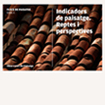
The Landscape Observatory of Catalonia and the Caixa de Catalunya Social Work Programme have just published the book Indicadors de paisatge. Reptes i perspectives (Landscape Indicators: Challenges and Perspectives), the second in the Landscape Observatory's collection "Plecs de Paisatge" ("Plecs de Paisatge"). Scheduled to be formally launched in the autumn, these are the results of the international seminar which, under the same title, was held in Barcelona in November 2007 with the joint cooperation of the Ministry of Town and Country Planning and Public Works of the Government of Catalonia and the European RECEP network. The different chapters approach landscape indicators from a variety of disciplinary perspectives and share some of the most interesting experiences in relation to the subject in the European sphere. The difficulty of putting together a listing of well-checked, understandable landscape indicators plus the relative newness of this field make this a work of striking methodological interest. It can be ordered from the Landscape Observatory of Catalonia and will soon be available in digital format on the website.
The Camprodon Valley Association Approves its Landscape Charter
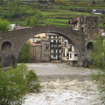
On 12 May 2009, the Camprodon Valley Intermunicipal Association unanimously approved the Camprodon Valley Landscape Charter. The Charter, which addresses landscape planning, ordering and management, consists of two documents: the "Diagnosis of Landscape Dynamics", undertaken in 2006, and the "Agreement and Management Plan for the Protection, Ordering, Management and Improvement of Landscapes". The Agreement and Management Plan underwent a coordination process by the local agents (public administration and private agents) in 2008. Now the document has at last been approved at the Association's Plenary Session. The six town councils of the Valley are now in the midst of approving the Camprodon Valley Landscape Charter. While this administrative process takes place in the municipalities, the Association is organising the formal signing of the Charter, at which all agents involved will make their commitment public. It should be recalled that the Camprodon Valley Landscape Charter has received broad support from the Valley's organisations. At present and prior to its signing, an endeavour is underway to encourage other supramunicipal governmental bodies to pledge themselves to some of the actions that are hoped to be carried out. These bodies include the Ripollès Regional Council, the Ripollès Development Consortium, the Ripollès Consortium for Places of Interest, the Girona Provincial Council, and certain ministries of the Government of Catalonia. The actions can be consulted here.
Transborder Workshop on Landscape Planning and Management to be Hosted in Olot
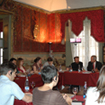
Inspired by the European Landscape Convention and since 2005, the French Ministry of Ecology, Energy, Sustainable Development and Territorial Planning has set up yearly workshops to discuss methodologies for landscape planning and management with experts from different European countries. The first four of these annual workshops were held in countries or regions bordering with France (Wallonia, Spain, Italy and England). By the same token, the French ministry decided that this year it should take place in Catalonia. And, given that the Landscape Observatory of Catalonia has its headquarters in Olot, it was decided to hold it in this city on 11-13 June. The Workshop had the scientific backing of the Mixed Research Unit of the Centre National de Recherche Scientifique (CNRS) and the Social Dynamics and Spatial Recomposition Laboratory (LADYSS) of France. The aim of the meeting was to exchange opinions and work methodologies that would help respond to the following questions: How do landscape atlases or landscape catalogues contribute to the knowledge and application of landscape policies? How can landscape characterisation and assessment be connected with the definition of the aims of landscape quality? How can the definition of landscape quality aims be connected with the territorial and sector planning? More specifically the experiences of Catalan experts which have served as the basis for the discussion have been the Partial Territorial Plan of the Regions in Girona Province and the Camprodon Valley Landscape Charter (situated, as it is, by the French border). During these sessions became clear that both the French landscape atlases and the Catalan landscape catalogues (coordinated by the Landscape Observatory) are tools that provide useful information for territorial, town planning and sector policies. They are an opportunity to make landscape an important part of sector policies and to develop the right tools. What's more, they stimulate a collective reflection on the importance of landscape, the values related to landscape and possible future scenarios. The French ministry is currently working on the publication of the conclusions of all workshops held up to the present.
Serene Territories: a Model of Independent Rural Development
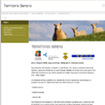
The Serene Territories project has come into being with the need to establish a new territorial development model for rural areas. Headed by the Lluçanès Consortium, and sponsored by the Catalan Ministry of Innovation, Universities and Enterprise, with the technical support of Barcelona Provincial Council, and developed jointly with the Moianès, Vall del Ges, Orís i Bisaura, and Cabrerès consortiums, this is a proposal for sustainable rural development with its own specific traits. Thus, for the Serene Territories project territorial and landscape conservation is particularly relevant as an endogenous resource, as are the ways of life and financial activity that it has created. The project's aim is threefold: to promote serene lifestyles, to further territorial and landscape conservation, and to boost economic activities based on its own quality products. In short, Serene Territories fosters territorial development with an identity of its own, in contrast to the urban development of metropolitan areas. It is a territorial model that seeks to underscore both the current values of these rural areas and the potentiality of their resources. For more information here.
European Landscapes and Globalisation

In May the city of Florence set the stage for an international seminar on the interrelation of landscape, Europe and globalisation (Paysages européens & mondialisation). The seminar, organised by the Universities of Paris 1 Panthéon-Sorbonne and Paris 3 Sorbonne Nouvelle, with the cooperation of different European universities, analysed the European landscape within the context of globalisation. The pressure of the world economy, urbanisation, demography and the climate change are some of the factors that explain the accelerated transformation of landscapes the world over in recent decades. In Europe, the particular development of each country has given rise to landscapes with different meanings and values yet with a common cultural background. At present though, the European landscape, like the European Union itself, vacillates between affirming local identities and opening up to exchanges and transformations of a more global nature. Within this globalisation context one inevitably wonders about the survival of the landscapes of the past and present. Summaries of the papers can be consulted here.
THE CHOICE
Bases per a una estratègia de paisatge de Mallorca. Desenvolupament del Conveni europeu del paisatge
Document containing the foundations, criteria, goals and basic lines of action which define the landscape strategy or plan for the island of Mallorca, promoted by the Council of Mallorca.
A guide to undertaking a landscape circle study in seven easy steps
A basic manual for preparing studies on the population's perception of the landscape, carried out by Landscape Alliance Ireland with the collaboration of the Heritage Council, published in 2008.
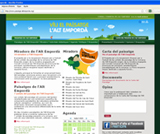
Viu el paisatge, l'Alt Empordà
The website of the Alt Empordà Regional Council, which looks at the region's landscape. It is divided into two sections: first, everything to do with the drafting of the Alt Empordà Landscape Charter and, second, information of a more general nature on the region, scenic vantage points, didactic activities and so on.

Government agency for the preservation of the Scottish natural heritage and landscape, while increasing training and the relationship of the people with the natural environment.
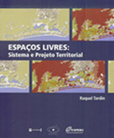 | Espaços livres: sistema e projeto territorial Tardin, Raquel. Rio de Janeiro: 7Letras, 2008. ISBN: 978-85-7577-552-3.
|
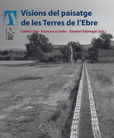 | Visions del paisatge de les Terres de l'Ebre Carles Llop; Francesca Leder; Emeteri Fabregat (eds.). Benicarló: Onada Editors, 2008. ISBN: 978-84-96623-34-7.
|
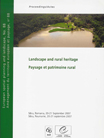 | Sixth meeting of the Workshops of the Council of Europe for Implementation of the European Landscape Convention: landscape and rural heritage Estrasburg: Council of Europe Publishing, 2009.
|
Publications can be found in the documentation centre of the Landscape Observatory. | |
AGENDA
LANDSCAPE IN THE PRESS
![]() Nota: This newsletter is an initiative of the Landscape Observatory. If you wish to subscribe and receive it by e-mail please click here.
Nota: This newsletter is an initiative of the Landscape Observatory. If you wish to subscribe and receive it by e-mail please click here.
© 2024 Observatori del Paisatge / Hospici, 8 - 17800 OLOT - Tel: +34 972 27 35 64
http://www.catpaisatge.net / observatori@catpaisatge.net